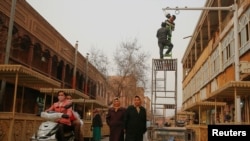The Chinese government uses extraordinary measures to surveille and persecute its Uighur Muslim minority in Xinjiang Uighur Autonomous Region. Chinese authorities have justified their crackdown on Uighurs, particularly those who practice their Muslim faith, by citing concerns over the “three evils” of “ethnic separatism, religious extremism, and violent terrorism.”
The government continues to closely monitor and restrict the movements of Uighurs, conduct indoctrination sessions, and confine thousands to “re-education camps” in its efforts to counteract what it considers religious extremism in Xinjiang.
According to press reports, Urumqi, the capital city of the region may be one of the most surveilled places on earth. Security checkpoints with identification scanners monitor the train station and roads in and out of the city. Police use hand-held devices and software they require individuals to install, to search smartphones for encrypted chat apps and other material deemed suspicious.
Under Xinjiang Communist Party Secretary Chen Quanguo, the police presence in the region has skyrocketed. Last year local police departments began ordering cameras capable of creating three-dimensional face images as well as DNA sequencers and voice-pattern analysis systems according to documents uncovered by Human Rights Watch.
Chinese authorities also collect personal information from Uighurs, asking about respondents’ prayer habits and if they have contacts abroad.
But worst of all are the mass disappearances of Uighurs in Xinjiang since the beginning of 2017. Tens of thousands of the missing are believed to have been sent to a vast network of detention facilities, including “patriotic re-education” camps, across the region. Among those singled out are Uighurs who have studied abroad.
Indeed, the Chinese government has sought the forcible repatriation of Uighur Muslims from foreign countries, many of whom sought asylum in those countries on the grounds of religious persecution. For students who choose not to voluntarily return, the Chinese government has sought for other countries to forcibly repatriate those Uighur Muslim students, many of whom had requested asylum from those countries on the grounds of religious persecution.
U.S. Secretary of State Rex Tillerson has drawn attention to increased restrictions on the ability of Uighurs in China to express and practice their religion. The State Department’s annual Human Rights Report also has highlighted repression of Uighurs’ freedoms of speech, movement, association, and assembly.














